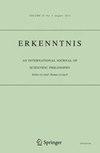A Logical Study of Moral Responsibility.
IF 0.8
2区 哲学
0 PHILOSOPHY
引用次数: 0
Abstract
This paper proposes a logical framework for studying the structure of moral responsibility for outcomes. The analysis incorporates two vital features: an agency condition and a negative condition of an alternative possibility. The logical language allows us to identify and disambiguate seven plausible criteria for moral responsibility. To accommodate interdependent decision contexts, the semantics are given in terms of so-called responsibility games. The logical framework enables us to classify the logical relations between these seven criteria for moral responsibility. Although all seven criteria are logically distinct, I also identify circumstances where the seven criteria locally reduce to only three.
道德责任的逻辑研究。
本文提出了一个研究结果道德责任结构的逻辑框架。该分析包含两个重要特征:代理条件和替代可能性的消极条件。逻辑语言使我们能够识别和消除七个似是而非的道德责任标准。为了适应相互依赖的决策上下文,语义是根据所谓的责任博弈给出的。逻辑框架使我们能够对这七个道德责任标准之间的逻辑关系进行分类。虽然所有七个标准在逻辑上是不同的,但我也确定了七个标准局部减少到只有三个的情况。
本文章由计算机程序翻译,如有差异,请以英文原文为准。
求助全文
约1分钟内获得全文
求助全文
来源期刊

ERKENNTNIS
PHILOSOPHY-
CiteScore
2.10
自引率
11.10%
发文量
116
期刊介绍:
Erkenntnis is a philosophical journal publishing papers committed in one way or another to the philosophical attitude which is signified by the label ''scientific philosophy''. It concentrates on those philosophical fields which are particularly inspired by this attitude, although other topics are welcome as well. These fields are:- Epistemology - Philosophy of science, foundations and methodology of science in general and of natural and human sciences such as physics, biology, psychology, economics, social sciences in particular - Philosophy of mathematics - Logic, philosophy of logic, and all kinds of philosophical logics - Philosophy of language - Ontology, metaphysics, theory of modality - Philosophical psychology, philosophy of mind, neurophilosophy - Practical philosophy, i.e. ethics, philosophy of action, philosophy of law, etc. One of the objectives of Erkenntnis is the provision of a suitable platform for the discussion of controversial issues; another is the provision of timely, competent reviews of important publications in an ever-growing field of research.In recent years, philosophers standing quite outside the pale of analytic philosophy have also paid careful, and indeed most welcome, attention to precision of concept and language, to arguments, and to well-grounded foundations. Erkenntnis provides for them, and for philosophers of all persuasions, a place of meeting, of discussion, and of disputation.Erkenntnis was originally founded in 1930 by Rudolf Carnap and Hans Reichenbach, it was revived in 1975 by Carl G. Hempel, Wolfang Stegmüller, and Wilhelm K. Essler. You can find more information about this in the article “Hempel: The old and the new ‘Erkenntnis’” accessible in the tabs to the right.Today, Erkenntnis is one of the leading journals in philosophy worldwide and attracts first-class authors at all stages of career; from young philosophers at the PhD level up to established academic philosophers and highly renowned senior scholars. We pride ourselves on supplying our authors with substantial referee reports, subject to a turnaround time of about three months until the first decision. The acceptance rate for publications in the journal is presently slightly below 10%.
 求助内容:
求助内容: 应助结果提醒方式:
应助结果提醒方式:


